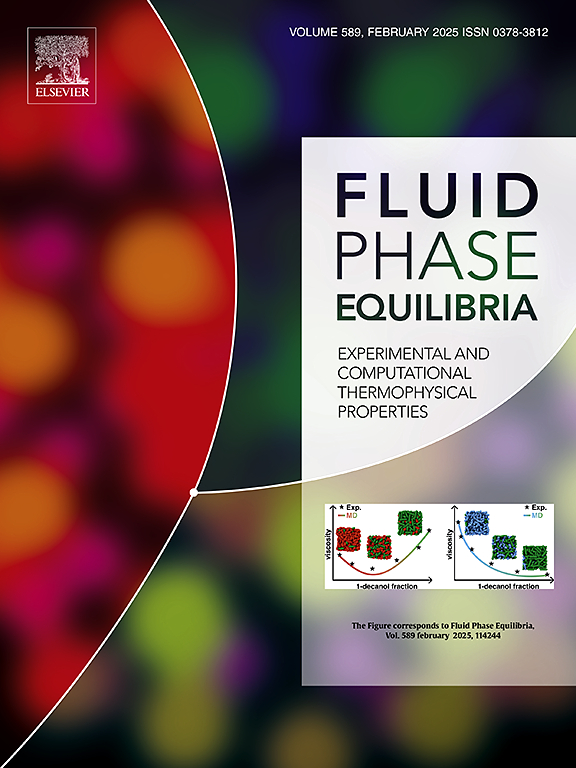Thermodynamic perturbation theory for associating fluids with coupling to isotropic attractions
IF 2.7
3区 工程技术
Q3 CHEMISTRY, PHYSICAL
引用次数: 0
Abstract
The coupling between dispersion and hydrogen bonding attractions is mostly ignored in the development of equations of state for hydrogen bonding fluids. While a reasonable approximation in the development of semi-empirical equations of state, the independence of hydrogen bonding and dispersion attractions is not rigorously justifiable. Both hydrogen bonding and dispersion attractions result from the interaction of electrons between two molecules, hence they emerge from the same underlying phenomena. In the pursuit of more accurate equations of state, including the coupling between hydrogen bonding and dispersion attractions in a self-consistent manner should be explored. In this work the coupling of dispersion and hydrogen bonding attractions is incorporated in the development of Wertheim’s thermodynamic perturbation theory for hydrogen bonding molecules. The developed theory is general for pure hydrogen bonding fluids with any number of association sites. The theory is applied to the case of hard spheres with isotropic square well attractions and a single association site. The theory gives counter intuitive predictions.
将流体与各向同性引力耦合联系起来的热力学摄动理论
在建立氢键流体的状态方程时,往往忽略了色散与氢键引力之间的耦合。虽然在半经验状态方程的发展中有一个合理的近似,但氢键和色散吸引的独立性并不是严格合理的。氢键和色散吸引都是由两个分子之间的电子相互作用产生的,因此它们产生于相同的潜在现象。在追求更精确的状态方程的过程中,应该探索包括氢键和色散吸引之间的自洽耦合。在这项工作中,分散和氢键吸引的耦合被纳入了Wertheim的氢键分子热力学摄动理论的发展。所发展的理论适用于具有任意数量缔合位点的纯氢键流体。该理论应用于具有各向同性方井引力和单一结合点的硬球的情况。该理论给出了与直觉相反的预测。
本文章由计算机程序翻译,如有差异,请以英文原文为准。
求助全文
约1分钟内获得全文
求助全文
来源期刊

Fluid Phase Equilibria
工程技术-工程:化工
CiteScore
5.30
自引率
15.40%
发文量
223
审稿时长
53 days
期刊介绍:
Fluid Phase Equilibria publishes high-quality papers dealing with experimental, theoretical, and applied research related to equilibrium and transport properties of fluids, solids, and interfaces. Subjects of interest include physical/phase and chemical equilibria; equilibrium and nonequilibrium thermophysical properties; fundamental thermodynamic relations; and stability. The systems central to the journal include pure substances and mixtures of organic and inorganic materials, including polymers, biochemicals, and surfactants with sufficient characterization of composition and purity for the results to be reproduced. Alloys are of interest only when thermodynamic studies are included, purely material studies will not be considered. In all cases, authors are expected to provide physical or chemical interpretations of the results.
Experimental research can include measurements under all conditions of temperature, pressure, and composition, including critical and supercritical. Measurements are to be associated with systems and conditions of fundamental or applied interest, and may not be only a collection of routine data, such as physical property or solubility measurements at limited pressures and temperatures close to ambient, or surfactant studies focussed strictly on micellisation or micelle structure. Papers reporting common data must be accompanied by new physical insights and/or contemporary or new theory or techniques.
 求助内容:
求助内容: 应助结果提醒方式:
应助结果提醒方式:


